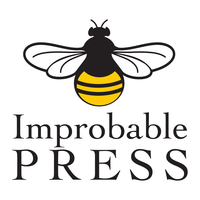By Atlin Merrick
Okay, this is a tricksy blog entry because I'm going to:
* Ask the writers of our most recent anthology, Anna Karenina Isn't Dead to do a thing I'm not willing to do;
* But only after I a little bit do the thing I just said I'm not willing to do.
And that thing is play favorites with our recent anthology Anna Karenina Isn't Dead.
Not Really But a Little Bit Kind Of
First I disclaimer all over everything: obviously all of the stories in the anthology are my favorites because these thirty-two tales were selected from over 220 submissions. This means I loves them all. I have thirty-two children and you can pry none of them from my very alive and thoroughly smacky hands. So don't even try it.
However.
We have two styles of story in the collection. The first wonderfully rewrite the tales of women who were originally front and center but poorly done by, this includes Béatrice de Charmoy's "Lilac," about Anna Karenina herself, Miranda Jubb's unnamed but very present protagonist in "Beyond the Wall(paper)", and Sadie Fox Curtis' Jane Eyre in "Helen Highwater."
More
"I met Arthur Conan Doyle…"
Growing Tales (Scales)
'Write What You Know' is Absolute Garbage
Then there's the other style of story, doing something I also dearly love:
Giving voices to the voiceless.
In Jack Fennell's "The Leopard Queen" one of Dr Moreau's creations not only has a voice, she uses it to explain why hell no, she absolutely will not stop what she's doing which is, quite literally, changing entire worlds.
In Lena Ng's "Made for a Monster," Frankenstein's second creation not only lives, she demands from her creator freedom for herself and the creature for whom she was made, then she decides what that means – whether Victor likes it or not.
Again and again in this collection women who in fiction had no voice or agency take it, make it, have it. Their writers found wonderful words for these women who were given none.
That's one of my very favorite things about this book. Along with everything else that's wonderful, which is all of it. So there.
Now I wonder, writers of Anna Karenina Isn't Dead, what are some of your favorite things in the collection – a quote, a concept, a particular story and why?

So many wonderful stories, and so many funny ones as well. I am particularly fond of Love Knot by Danny Chase as I’ve always hated that Bess’s sacrifice doesn’t actually save her lover’s life. Jack Fennell’s The Leopard Queen and the title piece by Beatrice de Charmoy were both wonderful. But honesty, they’re all a joy.
I am working my way slowly through the anthology and loving the experience. Hard to pick a favourite, but I do appreciate the observation in the opening essay (Counterstories) about how much the writers care about the stories they are reimagining. This is truly evident in what I have read; the project is not about ‘cancelling’ anything but exploring and deepening it further. I love this quote: “The worlds these authors created have inspired us to create in return; and so the unbroken golden thread of human creation spools outwards.”
“Beyond the Wall(paper)” was such a genius take! What a great idea & execution!
I was so honoured to be included in this, and at every step of the way of the book’s creation I found myself growing more and more impatient to see what else was included. And what can I say? It was worth the wait! Every single story or poem adds so much to the canon, and it is glorious to see them all together in one place. I think Improbable Press should do one of these at nice regular intervals, to allow even more ladies to join these alternative histories.
I’m only halfway through and I am LOVING this book! The first story, “The Leopard Queen” made ma laugh out loud in places. If you have ever enjoyed Jasper Fforde’s “Thursday Next” books, you will appreciate Jack Fennell’s take on book-hopping women. “Three Make a Tiger” by Nhu Le is a powerful retelling of a Vietnamese folk tale and I found myself cheering for Lady Trieu as the story progressed. “Love Knot” by Dannye Chase gives Bess and The Highwayman another chance at life, through Bess’s bravery and cleverness. Normally I race through books, but I’m reading these stories slowly because I don’t want to run out.